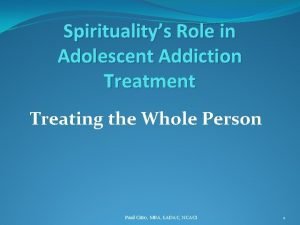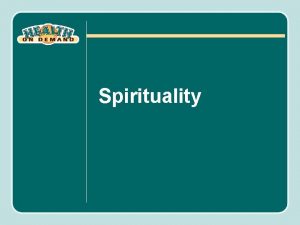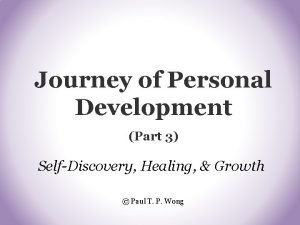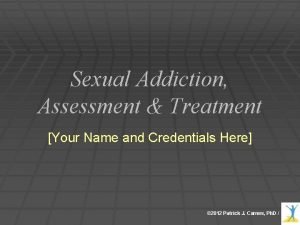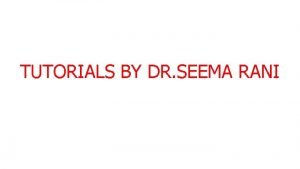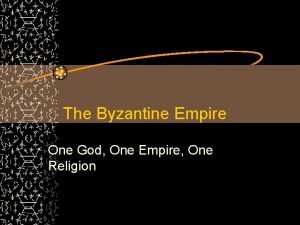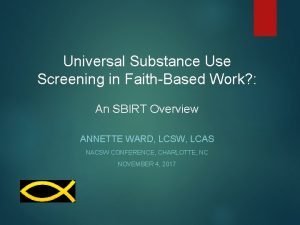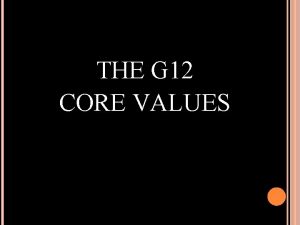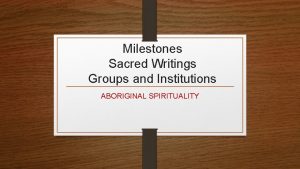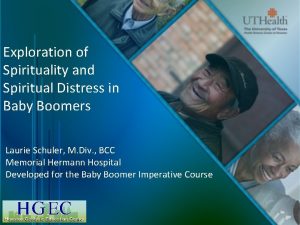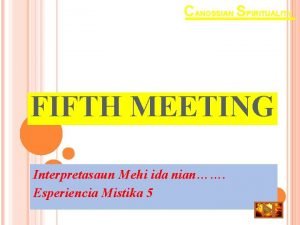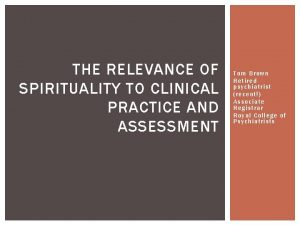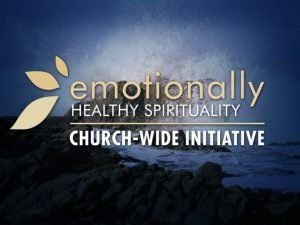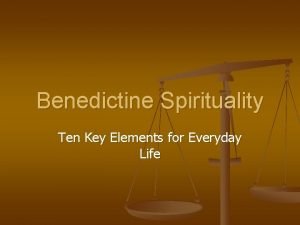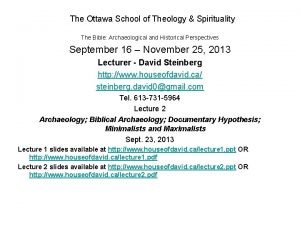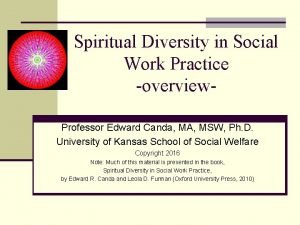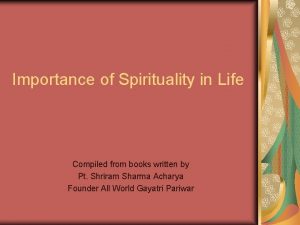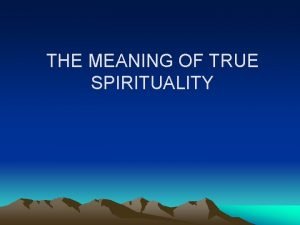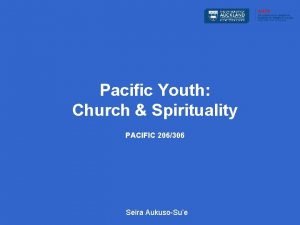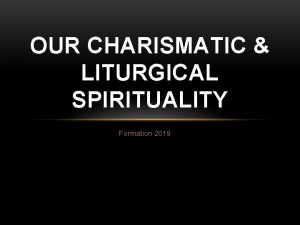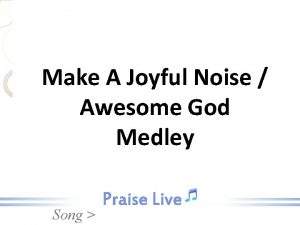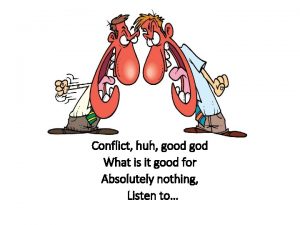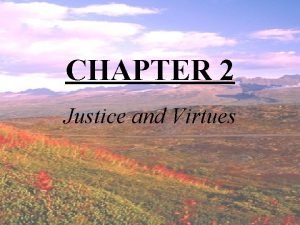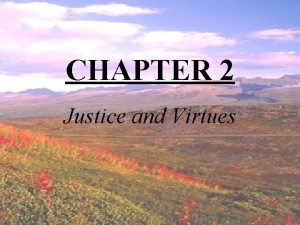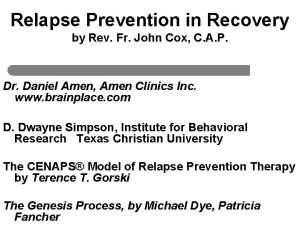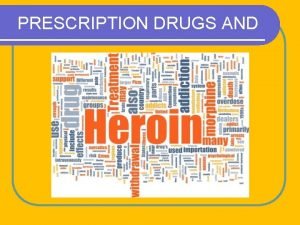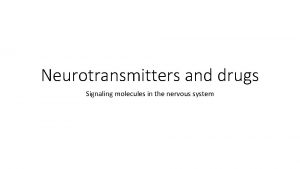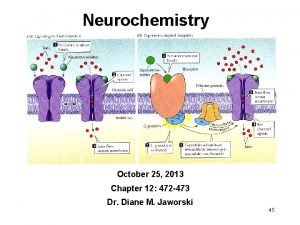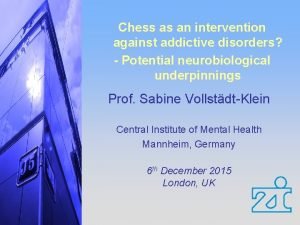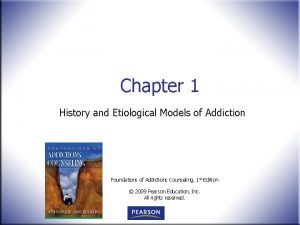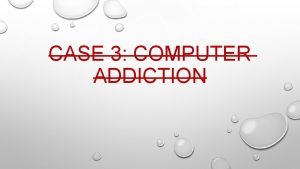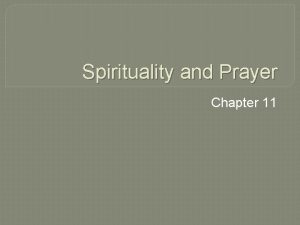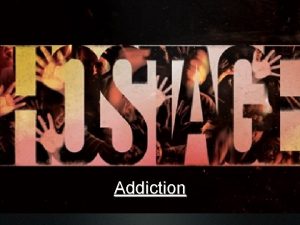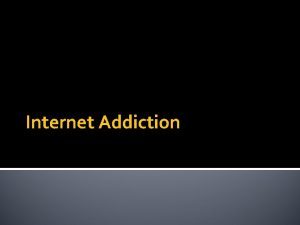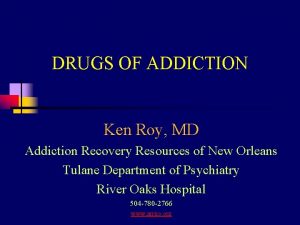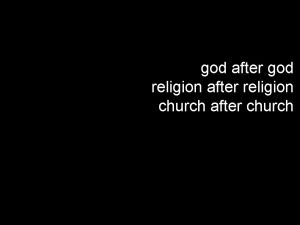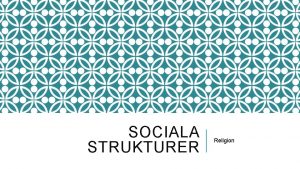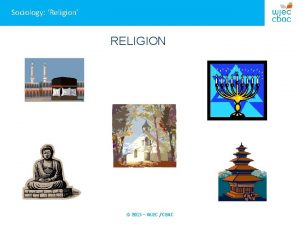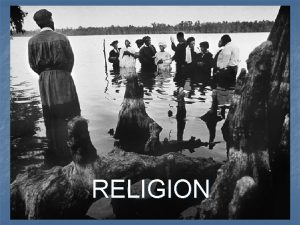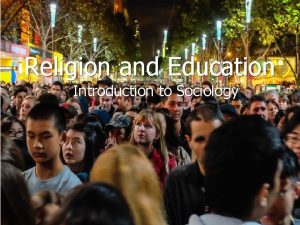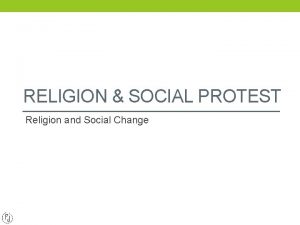ADDICTION RECOVERY WITHOUT GOD Or religion or spirituality


















































- Slides: 50

ADDICTION RECOVERY WITHOUT GOD Or religion, or spirituality or a higher power, etc… Tom Baier, MHS, LPC, CADC, CCS

“RECOVERY BY ANY MEANS NECESSARY UNDER ANY CIRCUMSTANCES. ”

WHY THIS TOPIC? • National data continues to highlight the reality that more Americans than ever before self report as being unaffiliated with any church, religion or spiritual belief system. • For counselors, it’s only a matter of time until you encounter that client who rejects any notion that God, spirituality or any substitute for a higher power is important or meaningful to them in a recovery process.

RAPID GROWTH OF THE RELIGIOUSLY UNAFFILIATED

CHRISTIANITY DECLINING WHILE OTHER FAITHS AND UNAFFILIATED GROWING

MAY 2017 GALLUP POLL • Since 1982 Gallup has been asking Americans: “Which of the following statements comes closest to your views on the origin and development of human beings? ”:

“WHICH OF THE FOLLOWING STATEMENTS COMES CLOSEST TO YOUR VIEWS ON THE ORIGIN AND DEVELOPMENT OF HUMAN BEINGS? ”: • God created human beings pretty much in their original form at one time within the last 10, 000 years or so. • Human beings developed over millions of years from less advanced forms of life, but God guided this process. • Human beings have developed over millions of years, but God had no part in this process (emphasis in

NATIONAL SURVEY DATA FOR THE CREATIONIST POINT OF VIEW 1982 2017 God created humans in their current form 44% 38% God guided the evolutionary process God plays no part in creation or evolution 38% 9% 19%

ABOUT THE DATA… • A limitation in the study includes both the wording of the choices as well as the choices themselves. In 2009 a separate survey modified the number of possible responses by adding two additional possibilities. 1. None of these come close to my beliefs. 2. Not at all sure which is true.

WHAT IS THIS MYSTERIOUS THING CALLED SPIRITUALITY? • The lack of a consensual definition of spirituality in the addictions field (Cook, 2004) has resulted in both theistic (belief in God) and nontheistic (inner strength, moral values) interpretations of spirituality (Kaskutas, Turk, Bond & Weisner, 2003; Arnold, Avants, Margolin & Marcotte, 2002).

RESEARCHING SPIRITUALITY In order to conduct scientific studies on spirituality and addiction recovery, scientists have been forced to operationally define spirituality and develop instruments that can measure changes in the degree of one’s spiritual orientation over time. These instruments include the Spirituality Self-Assessment Scale, the Spiritual Well-Being Scale, the Spiritual Belief 2 Scale, the Brief Multidimensional Measure of Religiousness/Spirituality and also the Religious Background and Behavior Scale used in Project MATCH (Gorsuch & Miller, 1999). These instruments measure such dimensions as: • belief in a higher power, • daily rituals of meditation/prayer, • life purpose and goals, • balance and wholeness, • personal values (e. g. , honesty, humility, compassion, forgiveness, tolerance), and

THE INDIVIDUAL 12 STEPS THAT SPECIFICALLY MENTION GOD: • Step 3 Made a decision to turn our will and our lives over to the care of God as we understood Him. • Step 5 Admitted to God, to ourselves, and to another human being the exact nature of our wrongs. • Step 6 Were entirely ready to have God remove all these defects of character. • Step 11 Sought through prayer and meditation to improve our conscious contact with God as we understood Him, praying only for

STANTON PEELE ON “RESISTING 12 STEP COERCION” • People are forced into 12 step programs everyday in America as a condition of their parole, regardless of their religious views. Not only is this a violation of the First Amendment, which states explicitly that a government agency cannot compel anyone to participate in a religious practice that you don’t personally believe in, but it can also do people serious damage. Addicts entering recovery are at their most fragile. If they are told that their addiction is a moral or religious problem, then relapse automatically becomes a moral or religious failure. Think how much harder that is to deal with. ”

A HISTORY OF GOD AND FELLOWSHIP AS A PATH TO RECOVERY • Before AA there was the The Oxford Group. Founded by Frank Buchman, a Lutheran Minister in 1921, it attained world wide fame by the time World War 2 began. • One of the guiding principles of the Oxford Group included The Five C’s for transforming “sinners”. They are: • CONFIDENCE • CONFESSION • CONVICTION • CONVERSION • CONTINUANCE

THESE 5 C’S WERE SUPPORTED BY THE FOUR ABSOLUTES: • Honesty • Purity • Unselfishness • Love

SOME PHILOSOPHICAL DISCREPANCIES Wilson got involved with the Oxford group in 1932 but eventually broke away, believing that certain aspects of the sessions were not effective with alcoholics. Specifically, Oxford Group members’ names were not kept anonymous, their practices were too “absolute” and the group operated on the basis of promotion rather than attraction.

BILL WILSON AND HIS ASSOCIATES BREAK AWAY FROM THE OXFORD GROUP They began what they called the “Word of Mouth Program” with Six Informal Steps: • We admitted that we were powerless over alcohol. • We got honest with ourselves. • We got honest with another person, in confidence. • We worked with other alcoholics without demand for prestige or money. • We prayed to God to help us do these things as best we could.

SIX BECOMES TWELVE • Despite coming from an agnostic background, Wilson expanded the Word of Mouth steps to become what they are today. • Some historians theorize that they took on a more religious tone with a Judeo-Christian emphasis because Wilson didn’t want to range too far from aspects that appeared to be working for the Oxford Group.

POTENTIAL CONFLICTS According to AA’s Preamble & Tradition 3, being an atheist should not be a bar to membership in AA. • However, most meetings open with “How It Works” with the following phrases repeated at each meeting: “…but there is One who has all power – that One is God. May you find Him now”. • Many meetings close with the Lord’s Prayer – a potential slap in the face to Tradition 3 and the Preamble. • As a result of these ritualized habits, non-religious people are often excluded, lectured or potentially ostracized.

SO NOW WHAT? OK, so I have a client who has made it clear that he won’t abide by language that asks him to surrender to the will of any deity or higher power and that fellowship meetings don’t work for him. What are your options?

A SECULAR SYNOPSIS OF THE 12 STEPS… Those twelve steps on the wall and in the book represent four things in essence: 1. A recognition that you haven’t been able get loaded in anything approaching moderation and without consistently creating havoc. 2. A surrender to the fact that this is a kind of law of nature for you, and that fighting it has been insane. 3. A willingness to let reality be the guide of your actions henceforth in this and in everything else. 4. A commitment to try and stop hurting yourself or others, and to help where you can.

IDEALLY, AS CLINICIANS, WE CAN EMBRACE THE UNKNOWN… • I beg you, to have patience with everything unresolved in your heart and to try to love the questions themselves as if they were locked rooms or books written in a very foreign language. Don’t search for the answers, which could not be given to you now, because you would not be able to live them. And the point is to live everything. Live the questions now. Perhaps then, someday far in the future, you will gradually, without even noticing it, live your way into the answer.

THERE ARE TWO CONSIDERATIONS AT THIS JUNCTURE… • Clinical Considerations • Ongoing Support Considerations

CLINICAL CONSIDERATIONS As if it’s not already obvious, a major consideration involves the ethical principle that says the we do not impose our own values upon those that we treat. The fact that you might be a very religious or spiritual person and your belief that your own recovery would not have been possible without your reliance upon a higher power is meaningless.

ALSO… It’s worth keeping in mind that fellowship is not treatment and, ideally, treatment is not fellowship, even though there remains considerable confusion in this regard even among clinicians. How many times have you heard a treatment program described as “ 12 -Step based treatment”?

• • • Chronology of Secular AA & Related Recovery Literature 1991 - Martha Cleveland Arlys G. The Alternative 12 Steps: A Secular Guide to Recovery 2010 - My Name is Lillian and I am and Alcoholic (And an Atheist) 2011 - Marya Hornbacher Waiting: A Non-Believerʼs Higher Power 2011 - Vince Hawkins An Atheists Unofficial Guide to A. A. 2012 - Joe C. - Beyond Belief: Agnostic Musings for 12 Step Life 2013 - Archer Voxx The Five Keys: 12 Step Recovery Without A God 2013 - Roger C. The Little Book: A Collection of Alternative 12 Steps 2014 - John Lauritsen A Freethinker in Alcoholics Anonymous 2015 -Adam N. Common Sense Recovery: An Atheist’s Guide to Alcoholics Anonymous 2015 - Roger C. Do Tell: Stories by Atheists and Agnostics in AA 2017 - Thomas B. Each Breath a Gift: A Story of Continuing Recovery

ONGOING SUPPORT CONSIDERATIONS Alternatives to traditional 12 -Step Fellowship • SMART • AA AGNOSTICA • RATIONAL RECOVERY

SELF MANAGEMENT AND RECOVERY TRAINING (SMART) An outgrowth of Albert Ellis’ work of Rational Emotive Behavioral Therapy (REBT), with consideration and influences from CBT and Motivational Interviewing.

SMART RECOVERY’S 4 -POINT PROGRAM 1. Building & maintaining motivation. 2. Coping with urges. 3. Managing thoughts, feelings & behaviors. 4. Living a balanced life.

SMART RECOVERY TOOLS Change Plan Worksheet – A chart where you list your goals, how you will attain them, ways in which you will overcome obstacles and challenges, etc.

SMART RECOVERY TOOLS Cost/Benefit Analysis (CBA) – A useful tool for increasing motivation to abstain from addictive behavior.

SMART RECOVERY TOOLS The ABC’s of REBT – Helps to identify unhelpful beliefs and change them to support making healthier choices.

SMART RECOVERY TOOLS DISARM (Destructive Imagery & Selftalk Awareness & Refusal Method) – Exposes the thoughts & images which urge us to pursue addiction as inaccuracies, excuses & rationalizations.

SMART RECOVERY TOOLS Brainstorming – The participant (in face-to-face or online) introduces a problem or question & other participants offer ideas and/or suggestions without judgement.

SMART RECOVERY TOOLS Role-Playing/Rehearsing – Group tool. Example: rehersing how to avoid addictive behavior at a high-risk upcoming event.

www. smartrecovery. org

ONGOING SUPPORT CONSIDERATIONS Alternatives to traditional 12 -Step Fellowship • SMART • AA AGNOSTICA • RATIONAL RECOVERY

AA AGNOSTICA The author, Roger C, is the manager of the website AA Agnostica. He was the “resident atheist” at the Faculty of Religious Studies at Mc. Gill University for several years and was treated with genuine respect. Not so in AA. It is hoped that over time a similar acceptance of nonbelievers in AA and other 12 Step recovery fellowships will be one of the results of A History of Agnostics in AA.

AA AGNOSTICA • AA Agnostica does not endorse or oppose any form of religion or atheism. Our only wish is to ensure suffering alcoholics that they can find sobriety in AA without having to accept anyone else’s beliefs or having to deny their own. • The word “Agnostica” is derived from Chapter Four, “We Agnostics, ” of Alcoholics Anonymous, otherwise known as the “Big Book”. When we use the word “agnostic” in relation to AA – or words like “atheist” or “freethinker” – we are simply referring to the specific wisdom of groups and individuals within the fellowship who understand that belief in a “God” (of any understanding) is not a necessary part of recovery from alcoholism.

AA AGNOSTICA In the spirit of rotation which is part of the “organization” of AA, in October 2015 a new website, AA Beyond Belief, took over what until then had been the mission of AA Agnostica: posting original articles by we agnostics and atheists on a weekly basis, mostly on Sundays. To regularly read about our “experience strength and hope”, make sure to subscribe to this website. Joe C, one of the founders of Beyond Belief, the first agnostic AA group in Canada, has his own website: Rebellion Dogs Publishing. The website offers readers very timely articles (and some music!) on the state of recovery in the twenty first Century. Joe, of course, is the author of Beyond Belief: Agnostic Musings for 12 Step Life, a daily reflection book. There is a section of the Pagan Press website that has some fine insights and links, Alcoholism: Recovery without Religiosity. John L. has been clean and sober for 45 years now and has written some wonderful posts for AA Agnostica, including A Proposal to Eliminate the Lord’s Prayer from AA Meetings. His Freethinkers version of the 12 Steps are also featured on the website.

AA AGNOSTICA The Buddhist Recovery Network “supports the use of Buddhist teachings, traditions and practices to help people recover from the suffering caused by addictive behaviors… Respectful of all recovery paths, the organization promotes mindfulness and meditation, and is grounded in Buddhist principles of non-harming, compassion and interdependence. ” The Fix offers up to date news about recovery (or the search for it) for pretty much everything that is called “addiction” these days… It does not “hold back” on engaging in issues that may be deemed controversial. One finds issues raised that are often only whispered about among friends in the rooms of traditional groups like 12 Step meetings

AA AGNOSTICA STARTING A SECULAR AA MEETING • Some will tell you that all you need is a resentment and a coffee pot. That’s because many new meetings get started when a few AA members find something amiss and decide they want a meeting of their own. • In fact, it’s not much more complicated than that. • You’ll need a meeting format of course. You can use the Secular AA Meeting Format and adapt it to suit your new group’s desires and needs. • For all kinds of other information (flyers, pamphlets, etc. ) you can also visit the website Secular AA. And, once it’s up and running, make sure to have your meeting and its details listed! You can do that by completing the “New Meeting Form” included under the “Secular Meetings” tab. • You will need a small group of people who will take responsibility for the meetings: unlocking the door, finding a chairperson, making the coffee… The long form of Tradition Three lays out the very simple requirements of an AA group: • Our membership ought to include all who suffer from alcoholism. Hence we may refuse none who wish to recover. Nor ought AA membership ever depend upon money or conformity. Any two or three alcoholics gathered together for sobriety may call themselves an AA Group, provided that, as a group, they have no other affiliation.

ONGOING SUPPORT CONSIDERATIONS Alternatives to traditional 12 -Step Fellowship • SMART • AA AGNOSTICA • RATIONAL RECOVERY

RATIONAL RECOVERY What is Rational Recovery? Rational Recovery® is the exclusive, worldwide source of counseling, guidance, and direct instruction on independent recovery from addiction to alcohol and other drugs through planned, permanent abstinence. We use an exclusive method, Addictive Voice Recognition Technique (AVRT®), which is by far the most cost-effective, dignified, private approach of all.

RATIONAL RECOVERY • What is Active Voice Recognition Technique®? AVRT® is the lore of independent recovery from substance addiction in a brief, consumer-ready, service-marked, educational format. Many thousands have recovered using The Crash Course on AVRT. In fact, AVRT is based upon the common thread of success as described to us by thousands of self-recovered people. It is a comprehensive remedy for addiction, allowing addicted people to fully recover in as short a time as they like, without regard to age of onset, the substance of choice, previous unsuccessful attempts at recovery, and the existence of other personal problems. AVRT-based recovery is nothing more or less than secure, permanent abstinence.

RATIONAL RECOVERY • Where is the nearest Rational Recovery meeting? There are no Rational Recovery groups, anywhere! In AVRT-based recovery, you are on your own. Based upon universal family values, AVRT is incompatible with the group format, and contradicts practically every concept presented in recovery groups and addiction treatment services. We believe strongly that your desire to attend recovery groups is couched in the belief or plan that you will ”have a relapse” if you do not attend meetings. In AVRTbased recovery, you will quickly recognize that self-doubt as an example of your Addictive Voice. Then, you will not want to congregate with others who would reinforce that crippling, dependent belief, or make predictions of suffering and harm to you if you don't accept their recovery doctrines.

RATIONAL RECOVERY • Where can I find a Rational Recovery® treatment center? There are no Rational Recovery® treatment centers, anywhere. We stand strongly opposed to addiction treatment in principle because, according to mountains of research findings, it does not work, and because it is most often harmful instead of helpful. Moreover, AVRT® is incompatible with addiction treatment, because the billing format requires that addicted people be diagnosed with a medical or psychological disease and provided services aimed at reducing the desire to get high. Addiction treatment seeks means to reduce or eliminate the desire to drink/use, but AVRT® welcomes residual addictive desire as evidence of robust, physical health. AVRT® is just too simple, too quick, too obvious, to easy, for insurance companies to justify the cost of medical surroundings with a large cast of misguided clinicians. AVRT-based recovery is independent recovery, without the use of groups, shrinks, and rehabs.

RATIONAL RECOVERY We do not endorse, authorize, license, or permit any other party to offer services called Rational Recovery® or Addictive Voice Recognition Technique® (AVRT®). We do not train or certify individuals in AVRT®. If you are offered Rational Recovery® or AVRT® by a treatment center or by a professional counselor, you are being seriously misled, and you will not receive services that are untainted by the presence of incompatible elements such as new age spirituality, whole-being, whole-person, or “holistic” silliness, nutritional and vitamin therapies, nature walks, cognitive-behavioral psychology, mediation exercises, disputation of irrational beliefs, and other confusing irrelevancies.

RATIONAL RECOVERY How can I learn more about AVRT? To get started on AVRT-based recovery, go to The Crash Course on AVRT. There, you can learn enough AVRT to fully recover. Remember, recovery is not a process, but an event, when you make an irreversible decision to never drink/use again. Once recovered, stay away from recovery groups of all kinds, set your confidence level arbitrarily at 100%, recognize all self-doubt as Addictive Voice, and you will do fine. Take credit for your recovery, as we are not interested in taking credit for your successes or failures, but by all means let others know about this escape hatch from addiction and recoveryism. Give us an email, so we can tell others about your AVRT-based recovery. •

RATIONAL RECOVERY Historical Connection Between Rational Recovery and SMART Recovery Rational Recovery once sponsored an extensive recovery group network offering cognitivebehavioral therapy along with an undeveloped version of AVRT. Professional counselors were invited to host RR groups as part of their professional practices, and a nonprofit organization was created to manage those activities. When the comprehensive nature of AVRT became better known, and its incompatibility with the psychological disease concept of addiction became clear, the nonprofit board attempted to seize control of the name Rational Recovery®. In 1994, a lawsuit ensued in which Rational Recovery Systems, Inc. , prevailed, and the nonprofit organization was denied the right to call itself Rational Recovery® or offer any information or service called Addictive Voice Recognition Technique® (AVRT®). The nameless shell corporation re-named itself and is now doing business as SMART Recovery.
 Spirituality and addiction
Spirituality and addiction Difference between spirituality and religion
Difference between spirituality and religion Spirituality vs religion
Spirituality vs religion Spirituality meaning
Spirituality meaning Recovery zone sex addiction test
Recovery zone sex addiction test Western religion vs eastern religion
Western religion vs eastern religion Without title by diane glancy
Without title by diane glancy Diane glancy without title
Diane glancy without title Alliteration in keeping quiet
Alliteration in keeping quiet This is the religion that god accepts
This is the religion that god accepts This is the religion that god accepts
This is the religion that god accepts One god one empire one emperor
One god one empire one emperor Sbirt faith and spirituality
Sbirt faith and spirituality Spirituality core values
Spirituality core values Spirituality meaning
Spirituality meaning Salesian youth spirituality
Salesian youth spirituality Aboriginal spirituality sacred texts
Aboriginal spirituality sacred texts Mi'kmaq spirituality
Mi'kmaq spirituality Spirituality definition
Spirituality definition Canossian spirituality
Canossian spirituality 4 principles of spirituality
4 principles of spirituality Four pillars of franciscan spirituality
Four pillars of franciscan spirituality Spirituality in clinical practice
Spirituality in clinical practice The problem of emotionally unhealthy spirituality
The problem of emotionally unhealthy spirituality Benedictine spirituality in everyday life
Benedictine spirituality in everyday life Ottawa school of theology and spirituality
Ottawa school of theology and spirituality Joan chittester. spirituality for the long haul
Joan chittester. spirituality for the long haul Features of spirituality
Features of spirituality Blessed is the pure in heart
Blessed is the pure in heart 4 principles of indian spirituality
4 principles of indian spirituality Importance of spirituality
Importance of spirituality Spirituality meaning
Spirituality meaning Samoan spirituality
Samoan spirituality Liturgical spirituality
Liturgical spirituality Jesus i am nothing without you
Jesus i am nothing without you Our god is an awesome god vine
Our god is an awesome god vine Our god is an awesome god
Our god is an awesome god God is an awesome god and greatly to be praised
God is an awesome god and greatly to be praised God is good god is great speed
God is good god is great speed O god you are my god earnestly i seek you
O god you are my god earnestly i seek you God-given virtues that direct us to our loving, triune god.
God-given virtues that direct us to our loving, triune god. Justice new testament
Justice new testament My god's bigger than your god
My god's bigger than your god Faster scale genesis process
Faster scale genesis process Learn.genetics.utah/content/addiction/mouse
Learn.genetics.utah/content/addiction/mouse Http://learn.genetics.utah.edu/content/addiction/
Http://learn.genetics.utah.edu/content/addiction/ Epinephrine in the brain
Epinephrine in the brain Journal of neuroscience methods
Journal of neuroscience methods Multicausal model of addiction
Multicausal model of addiction Do boys and girls share the same internet usage?
Do boys and girls share the same internet usage? Addiction expert witness
Addiction expert witness
